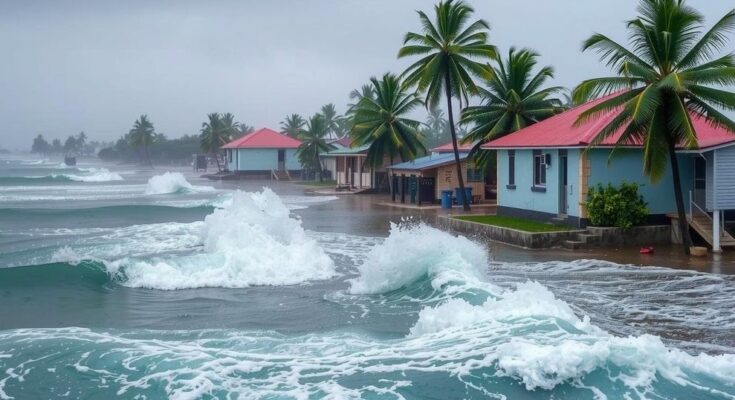The death toll from Cyclone Chido in Mozambique has reached 120, with 868 injuries and over 680,000 affected. Key provinces Cabo Delgado, Nampula, and Niassa suffered severe damage, with thousands of homes destroyed. Emergency shelters are in operation, and reports underscore the cyclone’s impact on essential services. Calls for international aid continue as recovery efforts commence.
The death toll from Cyclone Chido, an intense tropical cyclone that impacted northern Mozambique, has tragically increased to 120, with an additional 868 people reported injured and over 680,000 individuals affected, according to the latest statistics from Mozambique’s national disaster relief agency. The provinces of Cabo Delgado, Nampula, and Niassa have sustained extensive damage due to heavy rainfall and flooding induced by this natural disaster, as noted by the National Institute for Disaster Risk Management and Reduction (INGD).
Having made landfall on December 15, Cyclone Chido unleashed devastating rains and storms, resulting in significant destruction across the aforementioned provinces. Reports indicate that over 123,000 families, corresponding to approximately 622,610 people, have been affected, with more than 140,000 houses either partially or completely destroyed. Furthermore, the cyclone has heavily impacted 250 schools, 89 public facilities, and 52 health care institutions, adversely affecting nearly 110,000 students.
In response to this humanitarian crisis, the Mozambican government has established two emergency shelters, currently accommodating 1,349 displaced persons. The INGD highlighted the severe ramifications of Cyclone Chido on critical sectors such as education and healthcare. Their social media update conveyed, “The Cyclone Chido once again highlights the vulnerability of social infrastructure to climate change and the need for resilient planning to mitigate future impacts.”
Cyclone Chido originated over the southwestern Indian Ocean on December 5 and first struck Mayotte, a French overseas territory, before landing in Mozambique. Authorities and international humanitarian organizations continue to call for aid to assist affected communities as they confront the urgent challenges posed by this disaster.
Cyclone Chido can be classified as a tropical depression, characterized by a low atmospheric pressure over the ocean and a circular wind pattern caused by thunderstorms. If strengthened, it can evolve into a tropical storm and eventually into a tropical cyclone when wind speeds exceed defined thresholds.
(Source: IANS)
Cyclone Chido is an intense tropical cyclone that has significantly impacted the northern regions of Mozambique, particularly Cabo Delgado, Nampula, and Niassa provinces. Cyclones like Chido form over warm ocean waters and can lead to catastrophic consequences, including loss of life, injuries, and extensive damage to infrastructure. The rising frequency and intensity of such natural disasters are linked to climate change, making it increasingly important for countries to develop resilient infrastructures that can withstand severe weather events.
In conclusion, Cyclone Chido has caused extensive destruction and loss of life in Mozambique, stressing the vulnerability of the region to such natural calamities. The tragic figures reveal the considerable damage to homes, schools, and healthcare facilities, highlighting the urgent need for robust disaster management and climate resilience planning. As the affected communities seek recovery, local authorities and international organizations are urged to provide immediate support to meet their urgent needs.
Original Source: www.socialnews.xyz




